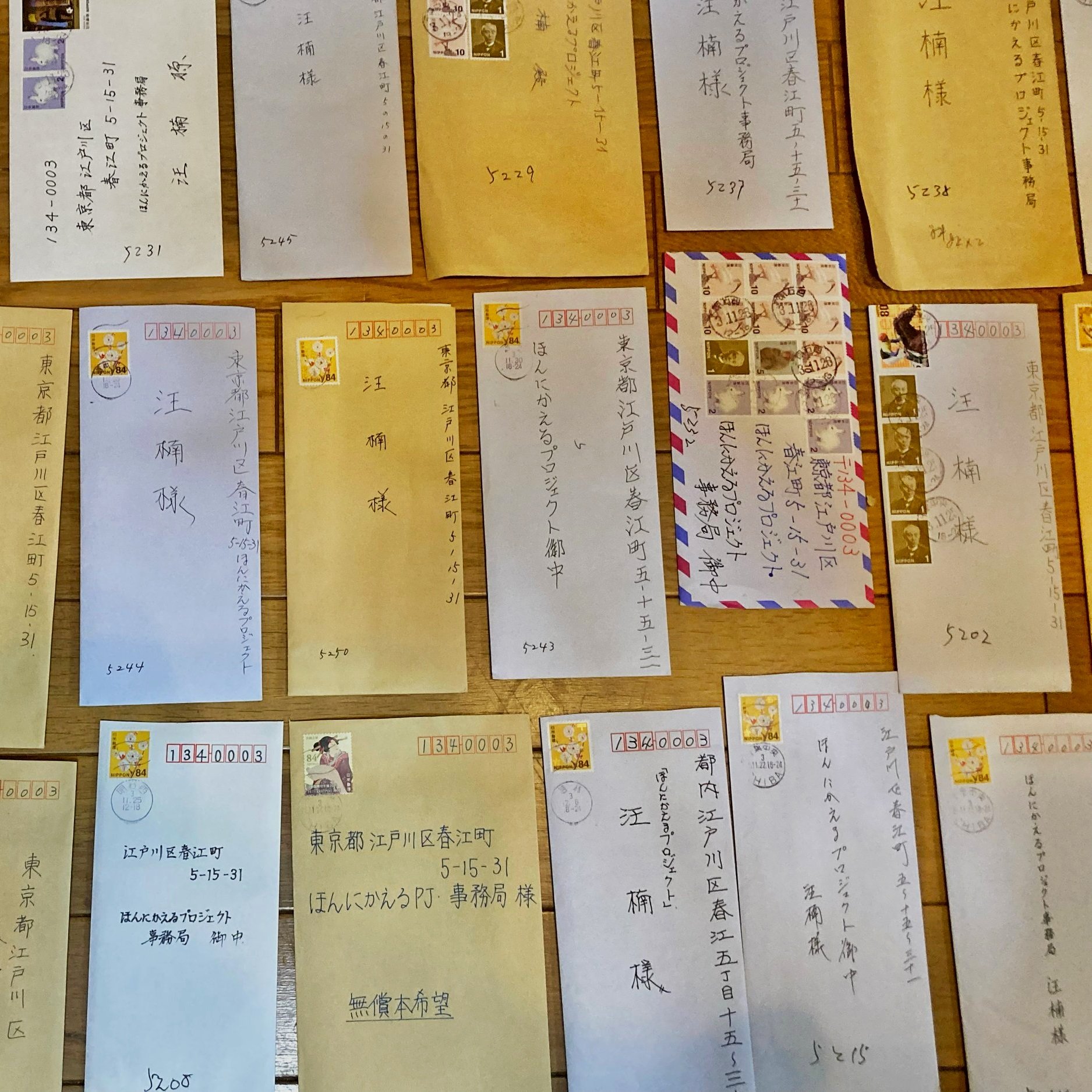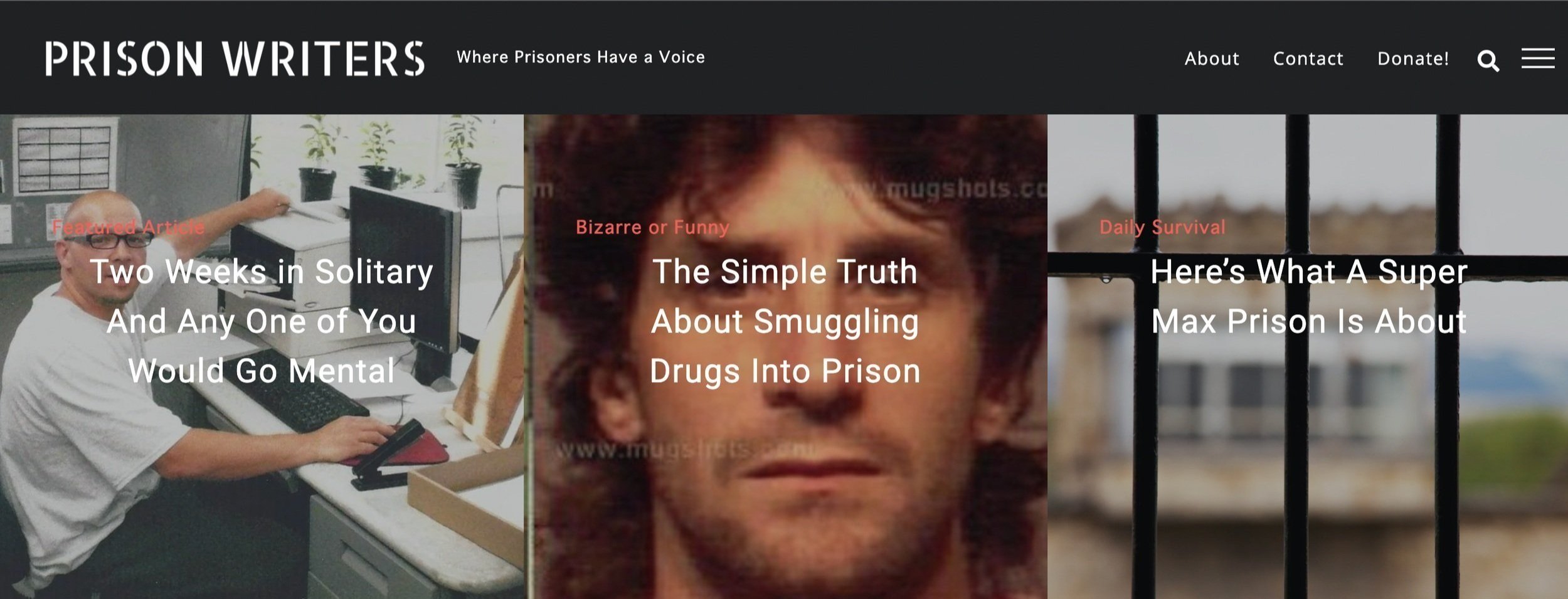
Honnikaeru Project
“Honnikaeru“ means to
“change/return to books“ in Japanese.
We have named our project with hope that we all can return to live our true lives and change ourselves through books.
We believe that “people have the freedom to change“.
What is Honinikaeru Project?
Honinikaeru Project was established in September 2015 as an organization to support the rehabilitation of prisoners. To date, we have sent approximately 10,000 books to more than 400 prisoners across Japan, helping them to spend their sentences in a meaningful way. We hope that reading books will give them a chance to rethink about their lives. We also correspond with the members we send books to, treating each prisoner as human beings and create opportunities to connect with society.
Honnikaeru Project Founder
Nan Wang
About Nan Wang: Founder of Honnikaeru Project
Born in China in 1972. Born into an elite family but affected by the Cultural Revolution, Wang was attacked by criminal gangs as a young boy, and moved to Japan on his 14th birthday. Wang was a founding member of the Dragon group that spontaneously formed to resist the severe bullying of second-generation orphans.
Second generation Japanese war orphans were brought over to Japan from China in the 1980s, some against their will, and children including Wang were enrolled in Japanese schools where they faced severe bullying and discrimination due to their lack of Japanese language skills and cultural differences. School bullying against these children escalated into violent attacks by criminal gangs. In order to resist these attacks, some of the children formed a group called the Dragon. The group grew in number and size, eventually turning into a mafia organization with members all over Japan. The criminal justice system against such criminal organizations in Japan was originally formed as a way of resistance against the Yakuza mafia. Dragon does not fall under the criminal organization ban law in Japan and is difficult to seize, and is involved in various crimes including homicide, burglary, fraud, drug related crimes and trafficking, etc.. Dragon is now one of the largest criminal organizations in Japan that is a major problem in the Japanese society today.
In 2000, Wang was arrested for fraud and was sentenced to 13 years in prison, serving time in Gifu Prison. He was released from prison in 2014. While in prison, Wang read over 3000 books and wrote tens of thousands words. Determined not to return to the world of crime, he launched the "Honni Kaeru Project" in 2015 to provide books of hope to prisoners across Japan. Wang has been featured in various documentaries, articles and media such as "NHK Special" and "The Nonfiction," and his first book, "Dragon and I: The Half-Life of Anger and Sadness of a Member of the Emergence Period," was published in January 2021.
About his autobiography:
”Dragon and I”
"50 people on their knees and breaking their arms, fingers, and teeth with a wooden sword one by one. Then from the bridge...”
“As I swung the katana sword, blood sprayed out like water from a hose…” Why I cut off the arms of yakuza with a Japanese sword.
“I locked him up and made him teach me” The picking technique of a former executive of Dragon who stole one billion yen by breaking into an office.
The text excerpted from his book was displayed at the top of Google for days and became a hot topic.
About “Dragon and I”
I have been a member of Dragon since its inception. The group was formed in Kasai, Edogawa Ward, Tokyo in the late 1980s by second and third generation Chinese orphans. During our days as a biker gang, we were called the "knife gang" for our cruelty, and eventually transformed into a criminal organization. Dragon is still very influential in the underworld as a representative of the "Han-Gure" gang. I myself have been involved in many crimes, such as cutting off the arms of yakuza and leading a group of thieves to rake in hundreds of millions of yen. I was arrested at the age of 28 and served 13 years in prison. Now that I have been released from prison, the reason why I decided to write this book is because I want to write down the thoughts and feelings that led me to create the group. Although the group has been transformed into a criminal organization, it was not intended to be such an organization when it was first formed. It was a spontaneous group to help the descendants of Japanese orphans in born in China who were isolated in Japanese society to survive. Some of the old members who were involved in the founding of the group regret the current situation of the group and want to dissolve it. We do not intend to use this book to justify what we have done. I would like to know who we were, why the monster called "Dragon" was born, and how I perceive Japanese society now that I have served my time as a criminal. I would like to write about this by looking back on my own life.
From "Dragon and I" / Saizusha, published January 27, 2021

Nan Wang and approximately 50 volunteer staffs work in with us
The Honnikaeru Project currently has 50 staff members, including home-based staff, supporting the rehabilitation of over 200 inmates in 30 prisons across Japan. We believe that it is most important for prisoners to feel that they are connected to society through visits and letters. The Honnikaeru Project aims to convey the message that there are people who care about each person by sending books, and preventing isolation from society through correspondence with prisoners. Here is an introduction to our activities.
Honnikaeru Project Support Details
Currently, most of the inmates who join Honnikaeru Project are through word of mouth within the prison. Members are divided into three categories: Membership 1, Membership 2, and Membership 3, each category offering different levels of support. Here is an overview of the membership levels.
▪Membership 1: Free of charge for inmates who cannot afford to pay the membership fee. We provide 12 free books per year from our book list.
▪ Membership 2: We provide 12 free books per year from our book list, as well as the ability to purchase books on Amazon, search for the lowest price on books, internet search, and print photos.
▪Membership 3: We provide 12 free books per year from our book list, as well as purchase books on Amazon.
We send books to inmate members across Japan
The Honnikaeru Project is currently engaged in support activities to send books to 200 inmates in 30 prisons throughout Japan.
We deliver the understanding and thoughts of our supporters together with the books.
The office receives many books sent to us from all over the country as donations.
Why we send books to
inmates
Although rehabilitation programs exist in Japanese prisons, they are difficult to take, and statistics show that less than 5% of inmates take these programs. While many inmates spend their days in vain, reading can make such a life meaningful and reshape one's personality. We send inmates books, believing that along with providing them with the opportunity to read, we can also watch over them and help them connect with their hearts and minds, thus creating a connection with society and a chance for rehabilitation.
Sending books requested from inmates in envelopes
We send out requested books along with our newsletters, handmade bookmarks and other occasional goodies, and handmade birthday cards for inmates who have birthdays coming up.
Books that inmates would want to read…
A list of donated books is compiled, and the list is regularly distributed to inmates. Inmates then choose books that they want to read from the donated book list, which we send to them for free.
Shipping to Prison
A stack of envelopes ready to be shipped to inmates. The envelopes that we use are donated and reused as well. It takes about two weeks from the time the mail arrives at the prison until it is processed and delivered to the inmates.






Correspondence with inmates
By corresponding with our inmate members and being there for them, we create opportunities to connect with society,
in hopes that inmates, including those who do not even wish to rehabilitate, understand that we are here, and that we care about them.
Corresponding with inmates
We receive approximately 1,200 letters a year from inmates. Some inmates join just because they can get books for free or at a discount, but even these inmates start to write to us about their daily problems and personal stories as we build a trusting relationship with them. What becomes clear is that everyone wants to be rehabilitated. But they are not sure about how they should live and whether or not they can be rehabilitated. Correspondence is a very important activity in creating an opportunity for rehabilitation.
Price search requests and purchase requests for used books
Inmates in Japanese prisons are closed to information, with no access to the Internet, etc. Much of their information comes from reading. Ordering books from the prisons is at a fixed price, so we use Amazon Marketplace to buy used books at a lower price and send them to them on their behalf. We accept up to 20 used books at a time to search for the lowest price and shipping costs. We then print out the search results and send them to inmates.
Internet Search requests from inmates
The "Internet Search Service" is the first of its kind in Japan. It is a service where we search the Internet for information that inmates want to know and print out the search results for them. Inmates are hungry for information, and we receive a variety of requests on a daily basis. Here are some examples of the search requests we receive from inmates.
Information on life insurance options
A request to find a lawyer that they only know the face of.
Price searches on auction sites for discontinued glasses
Search and purchase request for compression gloves
Request for an image of a specific tattoo artist's work
Information on their favorite car and used car price search request
Lyrics search request
Request to print Dakota Johnson images
Search request for distance learning to become a pastor
Request to see the faces of people on the radio show that inmates listen to in prison
Search request for a bag to send to a child entering elementary school
Street View of the streets of Philippine
Search request for old magazine covers
Search request for women's photo books
Request to find an organization that collects used stamps and sends vaccines to developing countries

PRISON WRITERS
ABOUT
PRISONWRITERS
This project is based on "PRISON WRITERS" in the United States. We have received permission from the organizer to call ourselves "Prison Writers Japan".
Crime and the way we perceive about crime has its roots in a person's personal history.
This is an effort to write down their own feelings and make their existence known to the world in order to look back on the past, remember one's former self, and search for the way to live in the future.
We have received letters from many inmates to the Honnikaeru Project.
Some write about their personal history, while others write about
the irrational and unfair treatment they receive in prison.
For inmates who have been cut off from society, the "Honnikaeru Project"
has become a safe place for them to express their feelings.
Contributions from prisoners are posted on the official website, and other online media.
PRISON WRITERS STORY
Submissions to Prison Writers are published twice a week.
The inmates who write the posts are the Honnikaeru Project Member inmates who are currently incarcerated across the country. The names of the inmates are kept private and the writer's number is the HonniKaeru Project member number.
We award 500 yen to inmates for each published submission, and comments and donations from viewers are also given to the inmates.
From the Prison Writers submission page.
The contributor's handwritten text is also posted along with the manuscript.
Prison Writers Report
We make booklets and distribute them to inmates since they do not have the opportunity to know what kind of contributions are published while in prison.
After prison support
Statistics show that many of those who have reoffended did not have a home to live in or a job.
For members who have served their time to truly rehabilitate themselves, they need a place to live and a job.
We ask for the cooperation of companies and introduce them to housing and employment opportunities.
"Honnikaeru Project" has been working hard to create opportunities for rehabilitation through the free donation of books and correspondence. Nevertheless, it is very important to put them into practice after their release from prison to see if they can truly be rehabilitated. What many prisoners often complain about in their letters is the lack of housing and jobs after their release from prison. The Ministry of Justice's "White Paper on Crime" clearly shows that this is an issue, as more than half of the recidivists are unemployed or have no permanent address. In Japan, even those with criminal records have the freedom to choose their occupation. However, the reality is that the longer they are incarcerated, the shorter the work history they can put on their resume and the fewer jobs they can do. They are often forced to do physical labor.
Meanwhile, the same goes for housing. For those released from prison who must live away from their hometowns with their "bad" friends, they need a house or dormitory to make a fresh start. In many cases, those released from prison who tend to be estranged from their families due to past crimes have difficulty renting rooms.
We have been involved in such "after prison support" for the past seven years. Fortunately, the government has begun to address the issue of recidivism, and a legal system for public support is now in place. Private organizations and companies are also beginning to take an interest in the issue, and we, as the "Honnikaeru Project," are committed to helping released inmates secure housing and jobs, although we are short on manpower and funds to complete their rehabilitation support.
People who have spent long periods of time in prison need rehabilitation. Based on our experience in providing rehabilitation support, the "Honnikaeru Project" proposes that released inmates receive public assistance for only one year. First, we will help them to live outside with the help of the government so that they can lead their daily lives.
For those who can work immediately, we will ask cooperating companies to secure jobs for them. We also ask companies to support housing. No matter how much support we provide, there will always be a certain number of people who fail. Nevertheless, we believe that this effort will lead to their rehabilitation, and we have supported them each time they are released from prison, believing in the possibility of their rehabilitation.
We ask for your cooperation.
Honnikaeru Project Founder
Nan Wang

The Honnikaeru Project is operated
with your support and understanding.
Contact Us
If you have any questions about donations, Honnikaeru Project’s activities, or if you have any comments, please feel free to contact Honnikaeru Project from the contact form on the right.












































